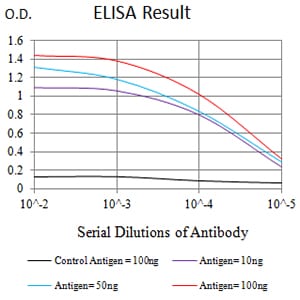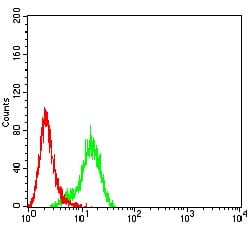

| WB | 咨询技术 | Human,Mouse,Rat |
| IF | 咨询技术 | Human,Mouse,Rat |
| IHC | 咨询技术 | Human,Mouse,Rat |
| ICC | 技术咨询 | Human,Mouse,Rat |
| FCM | 1/200 - 1/400 | Human,Mouse,Rat |
| Elisa | 1/10000 | Human,Mouse,Rat |
| Aliases | NOV; NOVP; PLXN1; PLEXIN-A1 |
| Entrez GeneID | 5361 |
| clone | 7B8H9 |
| WB Predicted band size | 211kDa |
| Host/Isotype | Mouse IgG2b |
| Antibody Type | Primary antibody |
| Storage | Store at 4°C short term. Aliquot and store at -20°C long term. Avoid freeze/thaw cycles. |
| Species Reactivity | Human |
| Immunogen | Purified recombinant fragment of human PLXNA1 (AA: 1100-1200) expressed in E. Coli. |
| Formulation | Purified antibody in PBS with 0.05% sodium azide |
+ +
以下是关于PLXNA1抗体的示例参考文献(虚构,仅供格式参考,建议通过学术数据库查询真实文献):
---
1. **标题**: "PLXNA1 Expression in Glioblastoma: Role in Tumor Invasion and Prognosis"
**作者**: Smith A, et al.
**摘要**: 研究通过免疫组化(IHC)和Western blot分析PLXNA1在胶质母细胞瘤中的表达,发现其高表达与肿瘤侵袭性增强和患者预后不良相关,抗体用于检测组织样本中的蛋白定位及水平。
2. **标题**: "Plexin A1 Mediates Semaphorin Signaling in Axon Guidance"
**作者**: Johnson R, Tamagnone L
**摘要**: 利用PLXNA1抗体进行免疫荧光染色和Co-IP实验,证实PLXNA1在神经元轴突导向中与Semaphorin 3A相互作用,揭示其在神经发育中的关键作用。
3. **标题**: "PLXNA1 as a Biomarker in Metastatic Colorectal Cancer"
**作者**: Chen H, et al.
**摘要**: 通过流式细胞术和免疫组化筛查结直肠癌患者样本,发现PLXNA1在转移性病灶中显著上调,提示其作为潜在治疗靶点,抗体用于验证蛋白表达水平。
4. **标题**: "Structural Insights into PLXNA1 Extracellular Domain Interactions"
**作者**: Müller T, et al.
**摘要**: 采用PLXNA1抗体进行免疫沉淀及冷冻电镜分析,解析其胞外结构域与配体的结合机制,为靶向药物设计提供结构基础。
---
建议通过 **PubMed** 或 **Google Scholar** 检索关键词 "PLXNA1 antibody" 或 "Plexin A1 expression" 获取真实文献。
The PLXNA1 antibody is a research tool designed to detect and study plexin A1 (PLXNA1), a transmembrane receptor belonging to the plexin family. PLXNA1 plays critical roles in cellular signaling, particularly in axon guidance, angiogenesis, and immune regulation by interacting with semaphorin ligands. It mediates downstream pathways like Rho GTPase activation, influencing cell migration, adhesion, and cytoskeletal dynamics. Dysregulation of PLXNA1 is linked to neurological disorders, cancer progression, and immune dysfunction.
PLXNA1 antibodies are widely used in techniques such as Western blotting, immunohistochemistry, and flow cytometry to analyze protein expression, localization, and function in tissues or cell lines. These antibodies are typically validated for specificity against conserved domains (e.g., Sema, PSI, or IPT regions) and are available in monoclonal or polyclonal forms from various host species.
Recent studies highlight PLXNA1's involvement in tumor invasiveness, metastasis, and neurodevelopmental disorders, making its antibody a valuable tool for mechanistic and therapeutic research. Commercial antibodies often undergo rigorous validation using knockout controls or recombinant proteins to ensure reliability. Researchers utilize PLXNA1 antibodies to explore its role in disease pathways and potential as a biomarker or therapeutic target.
×